A Statement by the Asian Human Rights Commission (AHRC) on the occasion of International Day in Support of Victims of Torture
The government of Pakistan has stated before the UN Committee on the Convention against Torture (CAT) that it does not intend to set-up legislation against torture and ill-treatment. On May 13, 2017 during the UN review, Pakistan argued that its pre-existing legal framework is in line with the provisions of the Convention.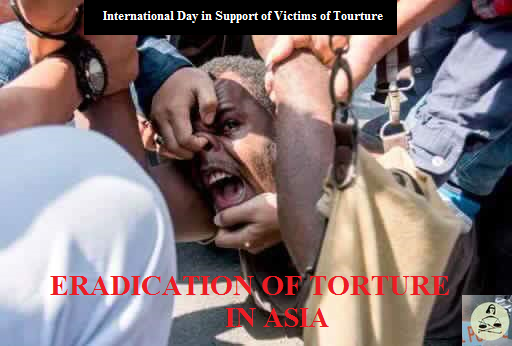
The State Report, submitted FIVE YEARS late, claims that torture is prohibited and prevented, with allegations of abuse effectively investigated and prosecuted.
Detailed discussions were held on the different reports of prevalence of torture in the country. On May 12, the United Nations panel condemned the “widespread practice of torture” in Pakistan by Police, the Military, and Intelligence Agencies. It called on Islamabad to implement urgent reforms.
After months of investigation, the UN Committee against Torture wrote its first report on the situation. They wrote that the police engage in the widespread practice of torture throughout the country–with a view to obtaining confessions from persons in custody.
What the Asian Human Rights Commission of Asia (AHRC) was writing about continuously on the menace of torture in the country was proved correct by the report. It said that Pakistani military forces, intelligence services, and paramilitary forces all “have been implicated in a significant number of cases of extra-judicial executions involving torture and enforced disappearances.”
One day before the reply from Pakistan’s delegation, the United Nations panel, on May 12, condemned the “widespread practice of torture” in Pakistan by police, the military, and intelligence agencies, and called on Islamabad to implement urgent reforms.
The report said Pakistani military forces; intelligence services, and paramilitary forces all “have been implicated in a significant number of cases of extra-judicial executions involving torture and enforced disappearances.”
It said the State had not acted on cases of people who disappeared or were killed in detention.
The UN urged Pakistan to enact reforms to prevent such abuses of power.
The military is the institution which hinders the criminalization of torture. Due to terrorist acts, it often forces the Government to continue with torture in the supposedly best interests of national security.
More than ten years have passed after ratifying the UN Convention against Torture and other Cruel, Inhuman or Degrading Treatment or Punishment (UN CAT). The Government has yet to compose legislation against torture and ill-treatment during custody.
Pakistan pledged to the UN Human Rights Council when it ratified the CAT that it would change its laws to comply with UN CAT. It has instead enacted additional, repressive laws such as the Pakistan Protection Ordinance (PPO). These laws have authorized absolute power for law enforcement agencies and increased the incidences of torture.
The Government’s reluctance to enact a new law is a deliberate attempt to support impunity for the law enforcement agencies—all on the pretext of maintaining law and order. The Government is not disposed to reforming the Police Institution. And in all of this, the Police have been reduced to mere mercenaries.
Criminal Justice System
The criminal justice system in Pakistan fails to protect the rights of its citizens from abuse of power. Without an overall drastic change in the criminal justice system, it is impossible to eradicate torture, extra-judicial killings and disappearances. The military, para-military forces and other law enforcement agencies (LEA) including the police consistently resist any reform to the criminal justice system. They do not want to make changes in the existing investigating system, based on custodial torture, in order to obtain confessions and monetary bribes.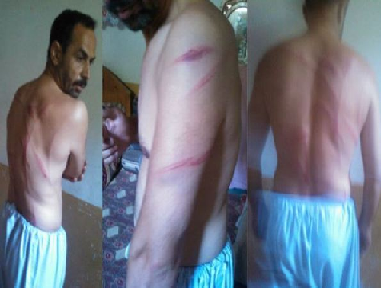
After showing reluctance before the CAT Committee to criminalize torture, it has become very obvious that the Government does not want to update its criminal justice system stemming from 1884! The Justice System is riddled with gaping holes. They have problems related to fair trial and convictions based on statements extracted through torture or other forms of ill-treatment. The Pakistani people are made to suffer the wrath of police officers who see themselves as above the law. Police officials are free to perpetuate atrocities in the name of maintaining law and order.
The Supreme Court of Pakistan has issued an order–criminal appeal No. 53 of 2017. Previously, Criminal petition No. 1232 of 2016 required all provinces, chief secretaries, AIGs and DIGs of police investigation wings and others to prepare a strategy or policy to improve the Criminal Justice System in the country, http://epaper.dawn.com/print-textview.php?StoryImage=19_06_2017_115_007. The officers in the provinces were reluctant to follow the order. However, the Sindh provincial police did prepare recommendations for improving the criminal justice system. They highlighted the need to control `inordinate and shocking delays` in the conclusions of trials. According to police this is caused by a host of factors. They include police investigators, prosecutors and the Court itself. The Courts are one of the major contributing factors behind the backlog of criminal cases, according to officials and documents reviewed by Dawn Newspaper.
The focus of the report was on delays in cases. It accused the Courts saying that police arrest suspects and submit Challans, but the Court releases them. It did not discuss any of the following: the functioning of the Police Investigation System; custodial torture used to force accused persons to confess to a crime; extra-judicial killings, keeping suspects incommunicado; out-moded methods of prosecution and delay of the Challans before the Courts.
The investigation process in Pakistan has caused mis-carriages of justice in several cases. Here is the example of Aftab Bahadur Masih. He was implicated in a crime by the co-accused Ghulam Mustafa. He later maintained that he was tortured into “confessing” to Aftab’s involvement in the crime while in police custody. Ghulam was willing to sign a statement declaring Aftab Bahadur’s innocence before his sentence was carried out. However, jail authorities in Multan prevented Aftab Bahadur’s lawyers from getting this statement signed (Read more here). Aftab Bahadur was hanged on 10 June 2015, despite requests for mercy from different rights group. Before his death, Aftab Bahadur wrote a heart-wrenching letter depicting his trials and tribulation at the hands of the criminal justice system. (The letter can be read here.)
Investigation through torture is a common practice of the Police in Pakistan. The menace of torture is a colonial legacy, which has continued on in Pakistan for decades. Torture is generally used to extort confessions from detainees. Unfortunately the general population has absorbed this attitude. Jailed inmates in Pakistan undergo trial as prisoners, which is tantamount to another form of torture. Similarly, handcuffing of those in custody is illegal. But the Police persist in doing it. State agents justify torture “in good faith” to protect national security.
Judge Involved in Torture in his Home
Judicial Officers and their families are also involved in torturing and use the police to cover up their actions. The police do not file the cases of torture. As they are involved in the abduction of victims, they try to force the parents to reach a compromise and settle on an amount of money outside the Court’s jurisdiction.
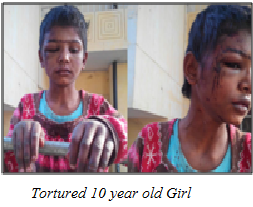 A 10-year-old child working as a domestic helper was tortured by her employers, an Additional Sessions Judgeand his wife. The girl was severely injured. The judge used his influence and position to settle the case outside of Court with the father of the domestic helper.
A 10-year-old child working as a domestic helper was tortured by her employers, an Additional Sessions Judgeand his wife. The girl was severely injured. The judge used his influence and position to settle the case outside of Court with the father of the domestic helper.
The juvenile, Miss Tayyaba, was detained in wrongful confinement in the official residence of this Sessions Judge in Islamabad. Tayyaba’s employers, Mr. Raja Khurram Ali Khan and his wife, punished her for a missing broom and forced her hands onto a hot stove. She was also beaten with a ladle, receiving a deep injury to the forehead, close to her right eye. http://www.humanrights.asia/news/ahrc-news/AHRC-STM-002-2017
Death in Custody
Death in custody is a common occurrence inside a jail. Sindh Parliamentary Affairs Minister, Nisar Ahmad Khuhro, recently informed the Sindh Assembly that as many as 104 prisoners have died in different Sindh jails in the past three years. The high number of deaths is attributed to natural causes? However, the fact remains that the inhuman conditions prevalent in the Pakistani jails is tantamount to torture, causing inmates to die in large numbers. Karachi Sindh Province Central Prison is notorious for the torture and ill-treatment of their inmates. In 2016, some forty Muttaida Qoumi Movement (MQM) workers were beaten up in the Karachi Central Prison by para-military forces in order to extract ‘favorable’ statements from them.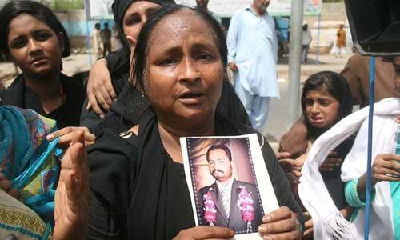
The LEA officials deem themselves above the law and one routinely finds extreme cases of torture in custody. In a case reported by the AHRC in its Urgent Appeals 03-4-2016, two generations of a family from Punjab Province suffered the wrath of police officials. The crime of the family–they dared to use their civil rights. They complained against police atrocities, tortureand failure to retrieve hundreds of thousands of extorted monies from police officials. As a result, the officers threaten that they will be killed in encounters. They want them to withdraw their complaints from the High Court in Lahore, and from other authorities including the Anti-Corruption Directorate.
Half Fry, Full Fry Modus Operandi
“Half-fry” and “full-fry” are terms used predominately by police in the interior parts of Sindh Province. They are code words for extra-judicial killings or injuring a suspect to cripple him. The use of the term “full-fry,” to indicate extra-judicial killings, showcases how common and open this extreme practice by law enforcement officials has become. Judges and murderers all rolled into one! Extra-judicial killers in uniform, use the pseudonyms of ‘half-fry’ and ‘full-fry’ to indicate the physical condition of a suspect.
Police in Sindh consider encounter killings the perfect way of getting rid of hardened criminals. They do not consider it a gross violation of human rights. Instead, they see it as an effective way of delivering justice. On 7 March 2015, in a press briefing that was recorded by Dawn Newspaper, the Deputy Inspector General of Sindh, Sanaullah Abbasi, claimed that extra-judicial killings are the best modus operandi to curb crime.
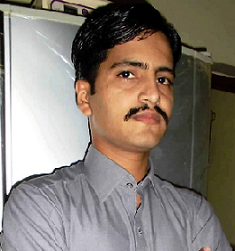 “Extra-judicial killings and other actions cannot be justified officially. But society has come to accept this ‘modus operandi’ of the police to eradicate crime and make the streets safer. It is not necessary for an encounter to be seen as genuine, only if a policeman loses his life in it. You can see that the police have restored peace and order in the city through this modus operandi.”
“Extra-judicial killings and other actions cannot be justified officially. But society has come to accept this ‘modus operandi’ of the police to eradicate crime and make the streets safer. It is not necessary for an encounter to be seen as genuine, only if a policeman loses his life in it. You can see that the police have restored peace and order in the city through this modus operandi.”
The AHRC reported the case of a “half fry” in October 2015. A psychiatrist, DrDeepak Raj, was maimed for life by police officers, who mistook him for a wanted criminal. Dr. Deepak Raj, was shot in the leg with 12 bullets. He lost the leg. His other leg and arm were badly damaged. Dr. Raj was grilled by the police in relation to a Hyderabad police assignment.
Rapist in Uniform
On 6 April 2016, Station House Officer (SHO), Digri Police Station, Badin District, Sindh Province, picked up a 20-year-old mentally challenged woman from her home. Later, after the victim’s complaint of rape, an FIR (No. 42) was registered against Digri SHO Mohammad Aslam Jamali, under Section 376 of the Pakistan Penal Code. Jamali was suspended and later arrested. However, with the help of his colleague, he managed to escape from police custody in Mirpurkhas District of Sindh Province.
Proving rape is in itself a difficult task. However, when the law enforcement agencies are involved in such crimes, it becomes next to impossible for a victim to seek and attain redress. Even in most of the cases that garnered media attention, the matter was hushed-up after the initial uproar and media frenzy.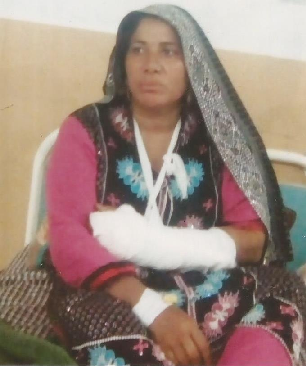
On 3 September 2015, six policemen raped a 22-year-old woman for three days while keeping her intoxicated. The victim told the police that Constable Shahzad Warraich, along with Zulfiqar and his four accomplices, kidnapped her at gunpoint. She said that the accused took her to a hotel and continually raped her after administering intoxicants. She alleged that the accused had taken gold ornaments from her worth 150,000 Rupees.
Under administrative jurisprudence, an act of a State functionary amounts to the act of the State itself. The State is responsible to protect and compensate its citizens if he/she is victimized by such actions
Update on Anti-Torture bill
Despite its obligations under UN CAT to enact an Anti-torture law, the Pakistani government has been dragging its feet in promulgating such an Act. The AHRC has been very vocal on the conspicuous absence of this law and has been lobbying for its enactment for some time. Due to the lack of political will, the Bill has not received presidential approval. The Senate passed the Anti-Torture Bill with some changes in the AHRC proposed bill. The Bill against custodial torture has been pending before the National Assembly since 2015. It is has been waiting for final approval from both houses of Parliament. Despite a two-thirds majority, the ruling party, PML-N, has resisted putting the Bill up for discussion. It is said that the security establishment does not want to pass an Anti-torture Law. Although the Senate has passed the Bill, it cannot be implemented until both houses pass it.